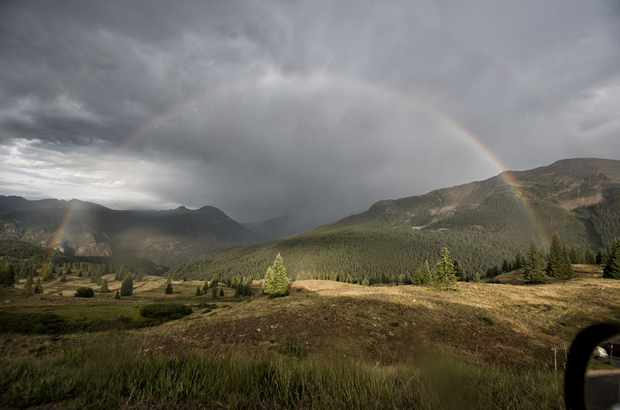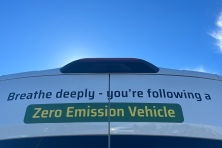It’s hard to believe that we’re already at the mid-year mark for 2016. As we head into the summer months, I wanted to provide you with a brief update on the first part of the year from Climate Solutions.
The first six months of the year were perhaps the most productive of our entire 18 year history. In proud partnership with a broad array of allies, we were able to win a groundbreaking victory in Oregon to dramatically increase renewable energy; we celebrated with the Lummi their halting of one of the largest proposed coal export facilities in the region; we held strong to protect important laws from attempted rollbacks; and we launched an exciting new initiative—Bright Future. Here are some highlights of how we’ve been advancing climate solutions:
Partnering for strong climate leadership in Oregon and Washington:
- This year, we won one of the most significant climate and clean energy victories at the state level anywhere in the country. In partnership with Oregon’s biggest utilities, Renew Oregon, and many more critical players, we waged a successful campaign that established Oregon as the first state in the nation to legislate an end to coal burning for electricity. Oregon is now committed to doubling the amount of renewable energy (including wind and solar) supplied to Oregon homes and businesses, attracting clean energy investment to our region. The law supports the expansion of electric vehicle infrastructure, a key strategy for reducing global warming pollution and moving us beyond our reliance on oil. It also creates an innovative community solar program—a great victory for Oregon, which is earning lots of attention around the nation as other states eye similar measures to boost renewable power.
- In Washington, Climate Solutions worked closely with Renewable Northwest and Sierra Club to pass a bill that will contribute to the closure of two coal generators in Colstrip, Montana—preventing five million tons of carbon pollution every year.
- Another bill Climate Solutions was closely involved with renewed and expanded Washington’s electric vehicle purchase incentive. Worth approximately $3,000 per vehicle, the package is among the most generous state incentives available.
Making sure we don’t make it worse:
- For the past six years, Climate Solutions has partnered with dozens of organizations to prevent the expansion of fossil fuel infrastructure along the West Coast—in particular, we have opposed new facilities for coal export and oil transport (and possible export). Preventing new construction of massive fossil fuel infrastructure is one of the most important things than can be done to stop adding even more climate disrupting pollution, as once these facilities are built, they lock in decades of pollution. In the six years that such proposals have been active in the Northwest, not one proposed coal export or oil transport facility has been built. Not one. Our thin green line stands strong.
- Earlier this year, our coalition witnessed and celebrated perhaps the biggest fossil fuel victory of the past half-decade when the federal Army Corps of Engineers agreed with the Lummi Nation that the proposed Cherry Point coal export facility would violate their tribal fishing rights, dealing the project a final blow. This was not just a major victory in the collective effort to stop coal exports, but also for the Lummi Nation in having the Army Corps uphold their long-fought for treaty rights.
- In Longview, Washington, Climate Solutions and dozens of organizations combined efforts to provide public comments on the largest proposed coal export facility in North America. On June 13th, the Power Past Coal coalition submitted more than a quarter of a million comments to the Department of Ecology in opposition to the terminal. We helped to organize more than 1,000 people to attend a public hearing on the proposal in Longview, one of three held across the state.
- In Vancouver, Washington, we worked with the Stand Up To Oil Campaign to oppose a proposal to build the largest oil transport facility in the United States. Earlier this spring, we delivered a record-breaking 276,296 comments on the proposed Tesoro-Savage oil terminal. As the recent oil train derailment in Mosier, Oregon showed, there is simply no place for shipping oil or other volatile fossil fuels on trains through our communities.
Showcasing our Bright Future:
In the spring, we launched our newest initiative—Bright Future. Our Bright Future initiative demonstrates that the rapid transition to clean energy and a low-carbon economy is possible, practical, and necessary. We know that the transition is possible—but can we get there fast enough to curb the worst of the possible climate impacts? We need many more people spreading the word that there is still a window of time to solve this. To that end, we are publishing a series of original articles and related resources illuminating the pathways to our bright future. By highlighting the good news about clean power, moving beyond oil, a just transition, the clean energy economy, and urban clean energy, Bright Future will create greater appetite for and momentum towards solutions at scale, and will help grow the climate movement calling for action. Finally, we have also continued our work highlighting the most important clean energy and climate news every week through Climate Cast.
We are far from resting on our laurels. While there is an enormous amount of good news, the impacts of climate change continue to be felt in the Northwest and around the globe. In the second half of this year, we will continue our work on stopping fossil fuel infrastructure; build support for strong state policy on climate change and clean energy heading into the 2017 legislative session in both Oregon and Washington; partner with cities across the region to grow clean energy solutions through our New Energy Cities program; and continue our work on lighting the pathways to a clean energy future through our Bright Future initiative. In addition, our staff will continue the internal work of our Equity, Diversity & Inclusion and Strategic Planning Committees throughout 2016 and 2017.
Our recent string of successes would not have been possible without support from individual donors. Thank you so much for your support of Climate Solutions, and for all that you do to build the equitable clean energy economy to power our region.





